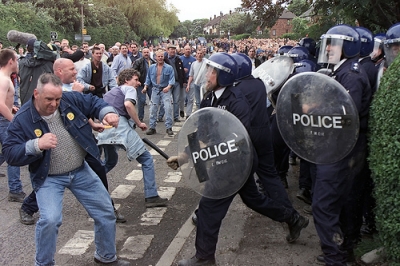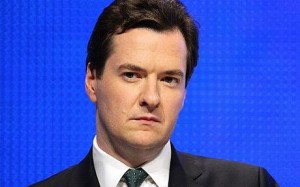Ridiculous…
 This article titled “McDonald’s and PepsiCo to help write UK health policy” was written by Felicity Lawrence, for The Guardian on Friday 12th November 2010 22.00 UTC
This article titled “McDonald’s and PepsiCo to help write UK health policy” was written by Felicity Lawrence, for The Guardian on Friday 12th November 2010 22.00 UTC
The Department of Health is putting the fast food companies McDonald’s and KFC and processed food and drink manufacturers such as PepsiCo, Kellogg’s, Unilever, Mars and Diageo at the heart of writing government policy on obesity, alcohol and diet-related disease, the Guardian has learned.
In an overhaul of public health, said by campaign groups to be the equivalent of handing smoking policy over to the tobacco industry, health secretary Andrew Lansley has set up five “responsibility deal” networks with business, co-chaired by ministers, to come up with policies. Some of these are expected to be used in the public health white paper due in the next month.
The groups are dominated by food and alcohol industry members, who have been invited to suggest measures to tackle public health crises. Working alongside them are public interest health and consumer groups including Which?, Cancer Research UK and the Faculty of Public Health. The alcohol responsibility deal network is chaired by the head of the lobby group the Wine and Spirit Trade Association. The food network to tackle diet and health problems includes processed food manufacturers, fast food companies, and Compass, the catering company famously pilloried by Jamie Oliver for its school menus of turkey twizzlers. The food deal’s sub-group on calories is chaired by PepsiCo, owner of Walkers crisps.
The leading supermarkets are an equally strong presence, while the responsibility deal’s physical activity group is chaired by the Fitness Industry Association, which is the lobby group for private gyms and personal trainers.
In early meetings, these commercial partners have been invited to draft priorities and identify barriers, such as EU legislation, that they would like removed. They have been assured by Lansley that he wants to explore voluntary not regulatory approaches, and to support them in removing obstacles. Using the pricing of food or alcohol to change consumption has been ruled out. One group was told that the health department did not want to lead, but rather hear from its members what should be done.
Professor Sir Ian Gilmore, the leading liver specialist and until recently president of the Royal College of Physicians, said he was very concerned by the emphasis on voluntary partnerships with industry. A member of the alcohol responsibility deal network, Gilmore said he had decided to co-operate, but he doubted whether there could be “a meaningful convergence between the interests of industry and public health since the priority of the drinks industry was to make money for shareholders while public health demanded a cut in consumption”.
He said: “On alcohol there is undoubtedly a need for regulation on price, availability and marketing and there is a risk that discussions will be deflected away from regulation that is likely to be effective but would affect sales. On food labelling we have listened too much to the supermarkets rather than going for traffic lights [warnings] which health experts recommend.” Employers are being asked to take on more responsibility for employees in a fourth health at work deal. The fifth network is charged with changing behaviour, and is chaired by the National Heart Forum. This group is likely to be working with the new Cabinet Office behavioural insight unit, which is exploring ways of making people change their behaviour without new laws.
Lansley’s public health reforms are seen as a test case for wider Conservative policies on replacing state intervention with private and corporate action.
While public interest groups are taking part in drawing up the deals, many have argued that robust regulation is needed to deal with junk food and alcohol misuse.
The Faculty of Public Health, represented on several of the deal networks, has called for a ban on trans fats and minimum alcohol pricing. Professor Lindsey Davies, FPH president, said: “We are hopeful that engaging with the food industry will lead to changes in the quality and healthiness of the products we and our children eat. It is possible to make progress on issues such as salt reduction through voluntary agreements, and we’re keeping an open mind until we see what comes out of the meetings, but we do think that there is still a role for regulation.”
Responding to criticism that industry was too prominent in the plans, the Department of Health said: “We are constantly in touch with expert bodies, including those in the public health field, to help inform all our work. For the forthcoming public health white paper we’ve engaged a wide range of people, as we are also doing to help us develop the responsibility deal drawn from business, the voluntary sector, other non-governmental organisations, local government, as well as public health bodies. A diverse range of experts are also involved.”
He added that the government wanted to improve public health through voluntary agreements with business and other partners, rather than through regulation or top-down lectures because it believed this approach would be far more effective and ambitious than previous efforts.
An over-arching board, chaired by Lansley, has been set up to oversee the work of the five responsibility deal networks, with representatives of local government and a regional health director – but it too is dominated by the food, alcohol, advertising and retail industries. Gilmore called for a better balance of commercial interests and independent experts on it.
Other experts have also expressed concern at Lansley’s approach. Professor Tim Lang, a member of the government’s advisory committee on obesity, doubted the food and drink industry’s ability to regulate itself. “In public health, the track record of industry has not been good. Obesity is a systemic problem, and industry is locked into thinking of its own narrow interests,” said Lang.
“I am deeply troubled to be sent signals from the secretary of state about working ‘with business’ and that any action has got to be soft ‘nudge’ action.”
Jeanette Longfield, head of the food campaign group Sustain, said: “This is the equivalent of putting the tobacco industry in charge of smoke-free spaces. We know this ‘let’s all get round the table approach’ doesn’t work, because we’ve all tried it before, including the last Conservative government. This isn’t ‘big society’, it’s big business.”

guardian.co.uk © Guardian News & Media Limited 2010
Published via the Guardian News Feed plugin for WordPress.
 With the unions fractured we may not be facing another winter of discontent, but you can bet your bottom dollar they’ll be people on the streets. Indeed the TUC has already announced plans to stage the “biggest and boldest event in our history”, with a national “mobilisation” that “will culminate in a national demonstration in central London” on Saturday the 26th of March, 2011.
With the unions fractured we may not be facing another winter of discontent, but you can bet your bottom dollar they’ll be people on the streets. Indeed the TUC has already announced plans to stage the “biggest and boldest event in our history”, with a national “mobilisation” that “will culminate in a national demonstration in central London” on Saturday the 26th of March, 2011.





Thatcher’s children can lead the class of 68 back into action
Good overview of ConDem cuts and ill-conceived Government policy…
When I was asked to speak at University College London’s campaign for a living wage for college cleaners, a couple of months back, I was not expecting that many students to turn up – but things turned out differently.
On Thursday, the day of the meeting, a student occupation was in full swing. The epicentre in the Jeremy Bentham room – where protesters are still camped out – was packed to bursting. A living wage, with the outsourced cleaners brought back in-house, had become one of their key demands. Here, as elsewhere, what started as protests about tuition fees accelerated into a political movement against cuts of all kinds. Inequality, poverty, the shredding of public services, unemployment, bankers and boardroom bonuses had become part of the protest. One fight, one struggle, they said, as if 40 years had suddenly fallen away. Not exactly Paris 1968, but in their sit-in meetings they were beginning to see themselves as the vanguard for a wider campaign. Thatcher’s children, selfish, materialist, apathetic? Not at all.
The scandalous abolition of the education maintenance allowance (EMA), which gives £30 a week to sixth-formers from the poorest families, is as central to their protest as their tripled fees. I read out a heartbreaking email I had just received from a Hackney sixth-former: she and her twin brother live with their disabled mother. Together they will lose £60 a week in allowance and wonder if they can stay on. She went on her first march on Wednesday, peacefully, far from any violence, and was horrified at being kettled by the police for five hours. Are police and government conspiring to turn peaceful young people into outraged militants?
By Friday morning the UCL students had won a living wage of £7.80 for their cleaners, joining 11 other London universities and colleges that have now signed up. This is part of the Citizens UK rolling campaign to raise poverty pay for cleaners, security guards, hotel chambermaids and others.
How will protest develop over the next 18 months, as the speed and scale of the cuts are felt? Every day more stories of cuts pour into my inbox, many never reported in the press. Five council youth centres are shutting in Haringey, north London, more elsewhere. Education for Choice – a small charity that arranges balanced debates in schools about abortion – is losing its grant and may fold. Here is a particularly mean-minded one: abolishing the mobility part of the disability living allowance means young and old in residential care will be trapped indoors, losing the money to hire a taxi to go out. Meanwhile, this week’s official report on stricter health tests for incapacity benefit revealed widespread cruelty and error.
Another eye-opener: the coalition has U-turned to shelve its pledge to protect public sector workers who blow the whistle on dangerous, corrupt or incompetent practices. Why? Ministers just realised it would also protect anyone revealing damage done to services by their own cuts.
Nothing, though, will shield the public from discovering how slap-happy Eric Pickles has arranged his budget: the Local Government Chronicle just reported his department in a state of panic as they realise, as predicted, their plans mean huge sums taken from the most deprived areas such as Barrow-in-Furness will be redistributed to the likes of Tunbridge Wells: the cabinet secretary is conducting an urgent review of how many more jobs will be cut by poor councils than by rich ones.
And how about this? The Speaker has just declared every bill with a cut in it as a “money bill”, and not eligible for Lords debate, amendment or vote. This week the bill cutting the child trust funds, health in pregnancy grant and the savings gateway for low-income families was deemed a money bill – although the Lords voted on it when Labour originally introduced it.
As there is no appeal against a Speaker’s diktat, Labour is seeking to protect the right of the Lords to debate and scrutinise these bills that have deep social implications. If they can’t, no cuts stand a chance of scrutiny, and the second chamber becomes virtually redundant when cutting is the government’s business. For the first time a coalition of two parties gives the government a majority in the Lords, yet Cameron is stacking in another 67 on their side. Those Lords resisting an elected chamber had better prove their vaunted independence by kicking up an almighty stink at being denied any voice in the main cuts legislation whizzing through Westminster.
So when the Metropolitan police commissioner talks of a new era of civil unrest, he may not know which way to look for the next wave. Will it be the cavalcade of wheelchairs that so alarmed politicians last time their users tipped themselves on to the pavement outside No10? More school pupils, losing not just EMA but by next year teaching assistants and teachers, along with libraries, swimming pools, school sports and youth clubs? Or mothers with prams, since women are the great losers in income, childcare, nurseries and other services? Or nurses from closed wards? The “squeezed middle” will be angry, the £12,000 to £30,000 earners about to lose £720 a year, as identified by the Resolution Foundation this week. The same middle saw the decade of GDP growth pass them by, with most new wealth sucked upwards to the top few percentiles.
No doubt the government secretly hopes violent protest by striking public sector unions will alienate popular support. The unions need to be cleverer than that, standing on the side of the public and never against them. Striking teachers sending children home so parents lose days of work will lose sympathy that would otherwise be guaranteed by more creative action.
The recklessness in coalition assaults on the NHS, benefits and council services, with the pain distributed so unjustly, suggests a high-risk government speeding without seatbelts. With so many candidates, it’s hard to tell what will erupt as iconic “poll tax” issues. Students are always first – energy, time and lack of children make protest easy. But the class of 68 may not be far behind, an older generation dusting down its memories and equally free of family to make its voice heard, the generation who had it all supporting the recession generations, growing up debt-laden with shrunken services, too few jobs and years away from owning a home.
guardian.co.uk © Guardian News & Media Limited 2010
Published via the Guardian News Feed plugin for WordPress.